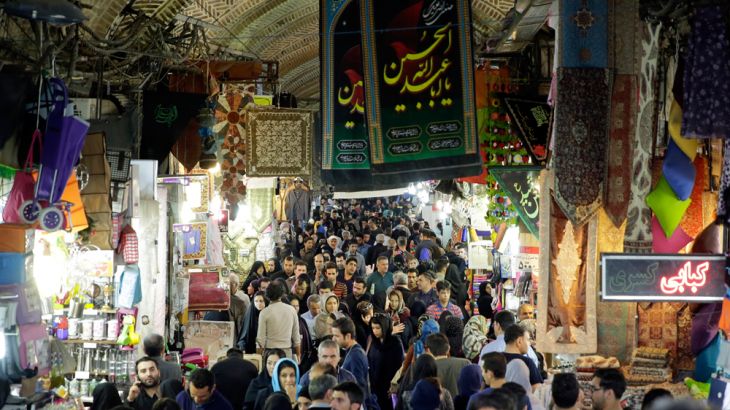
Iran nuclear deal one year on: Expectations vs reality
One year after the historic nuclear deal, Iranians are still waiting for the post-sanctions economic boom.
It has been a year since Iran signed its nuclear deal with major world powers – a reduction in its atomic capabilities in exchange for the lifting of economic sanctions.
President Hassan Rouhani promised economic prosperity, more jobs, more choice, lower prices and greater opportunities, but one year on, he is under pressure to deliver.
Keep reading
list of 4 itemsFacebook, Instagram face EU scrutiny over addictive effects on children
Who benefits from US tariffs on Chinese imports? Experts weigh in
Biden slaps new tariffs on Chinese imports, ratcheting trade war
On paper, it has worked. The International Monetary Fund is predicting 4.0-5.5 percent growth for Iran this year – a big increase on its pre-deal estimate of 1.5 percent.
But actual progress has been slow. Much was made of Iran’s return to the oil market, but with oil prices so low, the returns haven’t been great.
That resulted in a lack of confidence among Iranians about the future of their economy, and in many cases their business prospects too.
International firms are still hesitant about doing business in Iran, because of problems with the banking system, and the fact that not all sanctions have been lifted – just the nuclear-related ones.
So what has changed in Iran, and what has not changed in the past year? And why are Iranians less optimistic about their country’s economy than they were a year ago?
Counting the Cost talks to Abhishek Deshpande, the chief energy analyst at Natixis Bank in London, who explains what Iran has managed to achieve with the money it has made since returning to the energy markets. We also speak to Andreas Schweitzer, who has been investing in Iran since 2009 through his business Arjan Capital. He discusses the challenges facing businesses – both Iranian and international – trying to establish themselves in the Iranian marketplace.
Global Entrepreneurship Summit 2016
|
|
Hosted by the White House and US State Department, and held at Stanford University in Palo Alto, California, the Global Entrepreneurship summit (GES) 2016 aimed to bring together hundreds of entrepreneurs and investors from all over the world – putting all the right people in the right place to make business opportunities happen.
In part two of Kamahl Santamaria’s trip to Palo Alto, we focus on socially-responsible entrepreneurship – a new wave of young people who want to make money and be successful, but want to do it in a way which actually makes a tangible difference.
Reporter Tarek Bazley brings us the story of a simple solar-powered light fixture that is making life easier for people in Kenya, and the company behind it which wants to ensure its product is affordable and available to those who need it.
In a feature interview, Kamahl Santamaria speaks to Daniel Lubetzky who has founded five different businesses, all with a socially-responsible purpose – from creating healthy snack foods for American kids, to bringing together Israeli and Palestinian business people.
Kamahl also meets 11-year-old Hamish Finlayson from Queensland, Australia. Hamish has autism, and has designed no less than four smartphone apps to alert people to issues surrounding the environment, and autism itself.
![Kamahl Santamaria (left) and entrepreneur Daniel Lubetzky at the Global Entrepreneurship Summit 2016 [Al Jazeera]](/wp-content/uploads/2016/07/74bdb281a935440f9d8c1e5f17c3db56_18.jpeg)